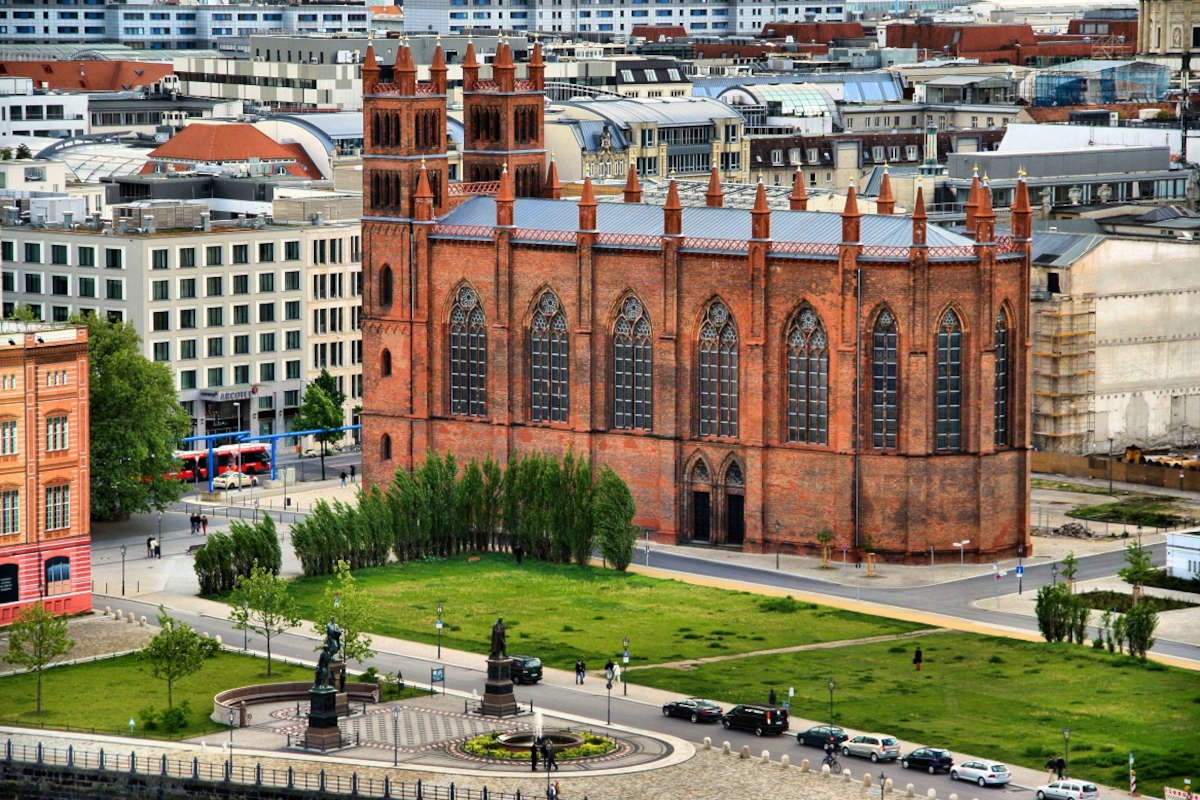With the crisis of religious faith and fewer and fewer practitioners, before long it is likely that churches will empty out and remain functionless buildings. What to do with them then? That’s what they are wondering in Berlin: it will be worth mentioning that in Germany the share of people who declare themselves non-religious, according to data collected in 2025 by the Fowid - Forschungsgruppe Weltaschauungen in Deutschland (“Research Group on Worldviews in Germany” of the Giordano-Bruno-Stiftung (Giordano Bruno Foundation), a nonprofit foundation active in the humanities, touched 46.7 percent. This is the largest group, followed by Catholics (23.65 percent), Protestants (21.51 percent) and Muslims (3.92 percent). To give a term of comparison, in Italy Catholics are 74.59 percent, atheists/agnostics are 16.96 percent and Muslims, the third predominant group, are 4.63 percent. And as the share of the non-religious seems destined to widen, the problem of empty churches becomes alive.
Therefore, a meeting between the Berlin City Senate and the Archdiocese of Berlin was held last Sept. 30 at the Red City Hall, where the issue of the importance of church spaces for Berliners was addressed. In the German capital alone, it will be worth mentioning, there are 120 churches and 180 parish centers. Both sides agreed that the multiple and continuous use of church buildings requires a coordinated approach. The Senate therefore welcomed the initiative of the Archdiocese of Berlin to invite the Evangelical Church of Berlin-Brandenburg-Silesian Upper Lusatia and the Senate to join a new working group that will be tasked with exploring the potential of church spaces in Berlin, as well as opportunities for collaboration and future use.
At the meeting, the Archdiocese of Berlin presented its consultation process for parishes, which aims to find sustainable solutions for the entire ecclesiastical real estate portfolio and for the development of individual properties. In the future, the properties-parsonages, parish halls, and church buildings-will be used for other purposes or even decommissioned on a large scale. Options on how the Senate can support the process of church transformation were therefore discussed.
Other issues in the areas of education, pastoral care and health care were also explored during the meeting. Both the Senate and the Archdiocese believe it is important to continue their proven close cooperation for the benefit of the city of Berlin, even in times of financial difficulties, and to jointly develop forward-looking solutions.

Berlin Mayor Kai Wegner said, “Berlin’s churches are an important partner and actor in urban society. Today we discussed how spaces that the church can no longer manage in the future can continue to be used by Berliners. Church buildings are places that define the identity of many people, regardless of their denominational affiliation. I warmly welcome the fact that the Senate and the Archdiocese of Berlin are strengthening their joint commitment and social responsibility with this new collaboration. I express my sincere thanks to the Archdiocese for its tireless commitment to pastoral care, adult education and religious education.”
Senator for Culture and Social Cohesion Sarah Wedl-Wilson said, “Church spaces are more than just places of faith. They shape our urban landscape; they are distinctive landmarks in the face of our city. They provide space for meetings, culture, education and social cohesion. In more ways than one, they offer orientation. And they are unmistakable: places of silence that invite us to contemplation and, in so doing, empower us. Church congregations are already pioneering multifunctionality: they open their doors to choirs, artistic projects or social initiatives. This commitment opens up the possibility of further developing church buildings as vibrant and accessible spaces that strengthen our community and point the way forward.”
Archbishop Heiner Koch of Berlin said, “In the real estate sector, we are initiating a collaboration between the archdiocese and the Land of Berlin, which has already proven effective in the field of education for many years: with religious education, we contribute to understanding and integration in our city. It helps promote respect and develop coexistence despite all differences. The coalition agreement included the introduction of a mandatory optional subject on worldviews and religions. We welcomed this initiative and look forward to its implementation during this legislature.”
 |
| In the future, so many churches will be of no use: in Berlin they wonder what to do with them |
Warning: the translation into English of the original Italian article was created using automatic tools. We undertake to review all articles, but we do not guarantee the total absence of inaccuracies in the translation due to the program. You can find the original by clicking on the ITA button. If you find any mistake,please contact us.